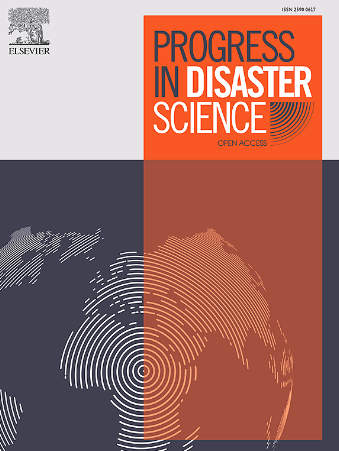Female farmers facing food insecurity and climate change vulnerability in rural area
IF 3.8
Q3 ENVIRONMENTAL SCIENCES
引用次数: 0
Abstract
Frequent lousy weather impacts the prevalence of food insecurity among women farmers and makes the agricultural sector more vulnerable to climate change. Detection of food insecurity due to climate change vulnerability using a quantitative survey method of 150 female farming households in Sleman. Based on data analysis using the FIES questionnaire and multinominal regression, 63 % of female farmers reported experiencing food insecurity, 24 % reported experiencing mild food insecurity, and the remaining 13 % reported experiencing moderate food insecurity. The frequent exposure to drought in agriculture experienced by women farmers and their ability to respond to the impacts of climate change influence the risk of food insecurity. Women farmers must have the right human, social, financial, and physical resources to adapt. Due to repeated exposure to drought, advanced age, farmers burdened with land rental costs, and lack of participation in farmers' associations tend to experience moderate food insecurity. Other contributing factors are greater remittance dependence and meager agricultural income (< IDR 500 thousand per month). On the other hand, if they can earn a monthly salary of IDR 2 million, own a house, and complete at least primary education, their chances of achieving food security will increase significantly.
农村地区面临粮食不安全和气候变化脆弱性的女性农民
频繁的恶劣天气影响了女性农民普遍存在的粮食不安全问题,并使农业部门更容易受到气候变化的影响。基于对Sleman地区150户女性农户的定量调查方法的气候变化脆弱性导致的粮食不安全检测根据使用FIES问卷和多项回归的数据分析,63%的女性农民报告存在粮食不安全状况,24%报告存在轻度粮食不安全状况,其余13%报告存在中度粮食不安全状况。女性农民在农业中经常遭受干旱,她们应对气候变化影响的能力也会影响粮食不安全的风险。女性农民必须拥有适当的人力、社会、财政和物质资源来适应。由于反复遭受干旱、老年人、负担土地租赁成本的农民以及缺乏农民协会的参与,往往会经历中度粮食不安全。其他影响因素包括对汇款的依赖程度较高和农业收入微薄(<;每月50万印尼盾)。另一方面,如果他们能挣到200万印尼盾的月薪,拥有一所房子,并至少完成初等教育,他们获得粮食安全的机会将大大增加。
本文章由计算机程序翻译,如有差异,请以英文原文为准。
求助全文
约1分钟内获得全文
求助全文
来源期刊

Progress in Disaster Science
Social Sciences-Safety Research
CiteScore
14.60
自引率
3.20%
发文量
51
审稿时长
12 weeks
期刊介绍:
Progress in Disaster Science is a Gold Open Access journal focusing on integrating research and policy in disaster research, and publishes original research papers and invited viewpoint articles on disaster risk reduction; response; emergency management and recovery.
A key part of the Journal's Publication output will see key experts invited to assess and comment on the current trends in disaster research, as well as highlight key papers.
 求助内容:
求助内容: 应助结果提醒方式:
应助结果提醒方式:


